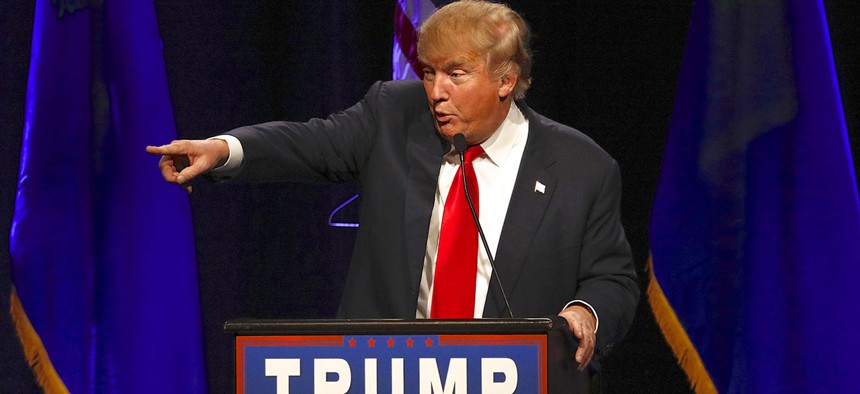
Joseph Sohm / Shutterstock.com
Donald Trump Could Ride Momentum to the Republican Nomination
If he wins Iowa, then an establishment candidate will face an uphill struggle to stop him.
How do you stop a boulder once it’s rolling downhill?
For a Republican establishment terrified of the damage that a Donald Trump nomination could wreak, that’s the physics problem it could face if the celebrity businessman wins both Iowa and New Hampshire in the first nine days of February.
Those states account for only 53 delegates of the 2,472 total in play, but a Trump victory in both could make wins more likely in South Carolina and Nevada later that month, which, under the laws of presidential-primary “momentum,” could make his nomination all but inevitable.
“The party can’t do anything,” said Ari Fleischer, a senior aide to former president George W. Bush. “He could be the nominee.”
In past presidential election cycles, front-runner momentum was usually seen as a good thing by Republicans Party leaders, allowing candidates such as Bob Dole in 1996 or Bush in 2000 to wrap up nominations relatively quickly despite early scares and start focusing on the November general election.
But never before has a GOP race been upended by an entertainer with near-universal name recognition and a penchant for controversy who, while wildly popular among a segment of the party’s base, could spell disaster in the November general election—and beyond.
“If Mr. Trump heads the Republican Party, it will no longer be a conservative party; it will be an angry, bigoted, populist one,” wrote Peter Wehner, an official in the past three Republican administrations, in a recent New York Times op-ed.
Fleischer agreed that a Trump nomination would result in both short- and long-term damage to the GOP’s standing as a national party. He added that stopping that from happening, should Trump win the first two contests, would require selflessness from all but one of the establishment candidates—former Florida Gov. Jeb Bush, New Jersey Gov. Chris Christie, Ohio Gov. John Kasich, and Sen. Marco Rubio. (Sen. Ted Cruz, who is also running as an “outsider” and similarly scares the establishment wing of the party, is seen as having little chance if he loses Iowa.)
“Unless all but one of the mainstream candidates drop out, there’s no stopping Trump,” he said. “And it has to happen sooner rather than later.”
Whether it’s the desire to get behind the winner, the fear of “wasting” one’s vote on a loser, or merely conforming to the group, the “momentum” phenomenon is real—measurably so.
Stanford Business School professor Jonathan Bendor described the “momentum” phenomenon in a 2011 book he coauthored, A Behavioral Theory of Elections. Bendor said what primary voters do actually makes sense, from the point of view of those who want to make a sound choice but haven’t spent much time studying their options.
He compared it to a diner unfamiliar with Moroccan cuisine going to a Moroccan restaurant for the first time. Looking for native Moroccans at other tables and ordering what they’re ordering is a sound strategy. Just so, voters in Georgia or Virginia or Florida look to see what voters did earlier in Iowa and New Hampshire and South Carolina, Bendor said.
“People take cues from other people,” Bendor said. “You shouldn’t think of this as simple-minded conformity. … Voting is an episodic activity at which most of us are amateurs.”
Examples abound in recent presidential elections.
In December 2003, Sen. John Kerry stood at 2.7 percent in a Georgia primary poll, behind five other candidates. Three months later, after having won Iowa, New Hampshire, and Nevada, Kerry won the Georgia primary with 47 percent of the vote on his way to the Democratic nomination.
“Let’s say Cruz wins Iowa, and he wins by a substantial margin. Then people think, ‘Oh well, Iowans thought about this, and they think Cruz is electable.’ If Rubio comes in third, then you get people thinking, ‘Oh, Rubio can’t win.’ This is, in effect, momentum. This is perfectly sensible behavior,” Bendor said, but acknowledged that it leaves something to be desired, from a civics standpoint. “Notice how I didn’t say it’s optimal.”
The potential good news for Republicans is that unlike the boulder rolling downhill, sometimes political momentum can be stopped just as easily as it starts—as then-Sen. Barack Obama learned in 2008. After a big come-from-behind win in Iowa thanks to an enormous voter-turnout effort, Obama lost New Hampshire to Hillary Clinton, setting off a months-long, delegate-by-delegate slog that lasted all spring.
That, in fact, is what party “establishment” candidates have been counting on, should Trump indeed win the earliest contests.
Sally Bradshaw, a top advisor to Jeb Bush, said his campaign has been planning for this for months. “Our strategy to grind it out is just that. We’ve prepared for a long campaign, building supporters in critical March states. We have aggressively approached ballot access to ensure we are getting on the ballot in every state,” she said. “It’s our belief that organization and ground game may be the only form of voter contact having significant impact this cycle—but no one will know with certainty until the votes are actually cast.”
Such a scenario could leave Trump, Cruz, and then one or two establishment candidates still in the race heading into the dozen contests on March 1, depending on how many run out of campaign money in February. But even two establishment candidates might be too many to prevent Trump from winning large enough pluralities to win more and more states, Fleischer worries.
As for a strategy that relies on a congressional-district-by-congressional-district, state-by-state battle for delegates similar to Obama-Clinton in 2008, Fleischer said he remains skeptical.
“It’s never worked before. It’s hard to see it working now,” he said.
(Image via Joseph Sohm / Shutterstock.com )
NEXT STORY: Senate to Vote on Limiting Syrian Refugees






